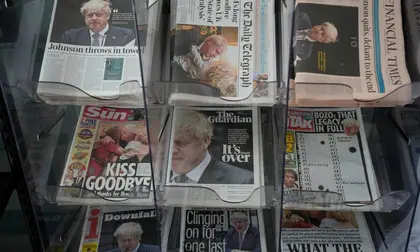After Boris Johnson’s resignation as leader of the Conservative Party, the jockeying for his post has begun. The Tories now plan to select his successor from among several candidates by September, and he or she will then take over as prime minister. Europe’s press examines what impact the change of leadership could have on the country’s policies.
Today, Europe’s press debates the resignation of British Prime Minister Boris Johnson, its implications for the United Kingdom and for Ukraine, and who might replace him as leader of the Conservative Party. Here are some opinions from a selection of European publications presented by eurotopics.
JOIN US ON TELEGRAM
Follow our coverage of the war on the @Kyivpost_official.
Tories will get all the coverage
The opposition won’t profit from the battle for the Tory leadership, for the time being, The Independent predicts:
“The only thing that leadership elections guarantee is saturation coverage by the media. Starmer will struggle to gain any attention over the next two months, so if there are unpopular but necessary things he needs to do, now is the time to do them. It will be a frustrating period for Labour, now that the leadership election is the only story in town. It seemed possible for a moment that the Tories might descend into recrimination and civil war, but even that only guarantees more coverage. … By the end of the campaign, the new prime minister will enjoy a honeymoon boost in the opinion polls.”

‘Putin Cannot Wait Us Out’ – Ukraine at War Update for June 14
Ukraine can count on London
The UK is likely to stay the course in Ukraine policy, writes Illya Kusa of the Ukrainian Institute for the Future on strana.news:
“Johnson’s resignation will change little. The policy of supporting Ukraine and confronting Russia is not the isolated idea of a single individual, but a consensus among the elite. Virtually all parties in Britain are critical of Russia and will not alter their stance significantly. What might shift is the nature of the rhetoric (Johnson was the best when it came to over-the-top pathos and theatrics during his trips abroad, and it will be hard to surpass him there), coordination with allies and the prioritization of objectives.”
No deviation from anti-Russian course
Defence Secretary Ben Wallace was seen as a favourite in the race to succeed Johnson but he has now announce that he doesn’t want to run. Regardless of who wins, not much will change in terms of the UK’s Russia policy, says Izvestia:
“Whoever becomes Johnson’s successor – and with Wallace even more so – Britain’s foreign policy course will not change. The alliance with the US, the activity in Nato, the contradictory relations with the EU and the support for Kyiv will all continue. The anti-Russian course will be preserved, the United Kingdom fulfils it stringently on the basis of fixed doctrines.”
A sign of democratic maturity
La Stampa praises the courage of those who have turned their backs on Johnson:
“The sentence is always the same, intimidating: How can you deal with a government crisis when war is looming? Well, war is here, and big time! We have been fighting Russia for more than 130 days with everything we have: weapons, the economy, diplomacy, propaganda, culture. And now it turns out that even in the midst of war solid, deeply rooted democracies are not afraid of crises. They accept them. They question themselves, they debate, they discard the besieged fortress psychology and vote out incompetents and insurgents. It is the tyrannies that call for unanimity, solidarity and the ‘union sacrée’.”
Time to step down as prime minister too
Boris Johnson’s desire to remain interim head of government is unacceptable to The Daily Telegraph:
“The Government has many important issues to face and decisions to make, such as pay settlements in the public sector at a time of rampant inflation. There is also the threat of a summer of strikes to contend with. Is it seriously being suggested that Mr. Johnson is in any position of authority to deal with these matters? … He was right to say there are pressing issues for the Government to address. That is why his successor needs to be in place within days, not weeks – and certainly not months.”
They knew exactly what they were doing
Aftonbladet editorialist Susanna Kierkegaard is furious about the way the resignation happened:
“The Conservative Party knew that Boris Johnson was a liar who would do anything to get into power. … But they chose him as their leader anyway – they wanted the benefits of Boris Johnson. Now they refuse to live with the consequences. I don’t want to belittle what Boris Johnson has done. … I’m tired of politicians who think they don’t have to abide by their own laws. … But I’m also fed up with parties that opportunistically elect despotic leaders and then regret it as soon as they run into a little headwind.”
Final blunder yet to come
ABC still expects an undignified endgame:
“The last of his blunders will be to force his own party colleagues to kick him out of Downing Street, because even in the present circumstances he prefers to ignore all the rules of political prudence and decency and simply cling to his office. … Johnson was never known for surrounding himself with personalities more talented than himself, precisely because he didn’t want anyone to outshine him. But even in this circle of power, one can now detect more political dignity than in the prime minister’s unrepentant attitude.”
A desire for more sobriety
Tagesschau.de now hopes for an end to populism in Britain:
“[T]he desire to be governed in a more sober, less disruptive way again can even be scientifically proven. The British are fed up with a prime minister with messy hair who slides along a tightrope waving a flag. Let’s not kid ourselves: the successor will probably stick to the basic Conservative course: a restrictive asylum policy, Brexit. But there is the chance of a better economic policy and a partner with whom the negotiations on the Northern Ireland Protocol might be easier. Boring politicians are sometimes not so bad.”
The Ukrainians will miss him
Johnson’s Ukraine policy was one of the few areas where he shone, writes the Financial Times:
“The one foreign capital where Johnson will be truly missed is Kyiv. Among western governments, the UK, led by its prime minister, has been one of the most supportive of Ukraine, both in diplomatic and military terms. In recent weeks Johnson has often appeared happier in Ukraine than in the UK. But Britain’s strong support for Ukraine reflects a firm cross-party consensus that is almost certain to persist, whoever becomes the next prime minister.”
Europe needs Johnson more than ever
Hardly any politician is as resolute in their stance against Putin as the British PM, writes the tabloid Blick:
“Johnson has taken a lot of liberties. … But these domestic scandals should not distract from the fact that Europe needs Johnson more than ever. No politician in the world – except Ukrainian President Volodymir Zelensky – has given Putin a clearer telling-off. … Johnson is more of a clown than a prime minister, his opponents complain. Perhaps. But what they overlook is that those people who are taking serious steps to stand up to the Kremlin are the clowns like Johnson or ex-comedian Zelensky. The world needs them urgently. Only they seem truly willing to disrupt the show of the brutal lion tamer in Moscow.”
Patience running out
The British are getting fed up with their prime minister, Ilta-Sanomat believes:
“In recent months, Johnson has been praised for his unbending resolve on the Ukraine issue. Johnson’s problem is that Ukrainians don’t vote in British elections. At home, Johnson’s opponents claim he’s just polishing his image with the war. So far, Johnson had weathered his scandals with ruthless rudeness. The British have always been sympathetic to their prime minister, who stumbled smilingly from one scandal to the next. Now their patience is running out.”
You can also highlight the text and press Ctrl + Enter






